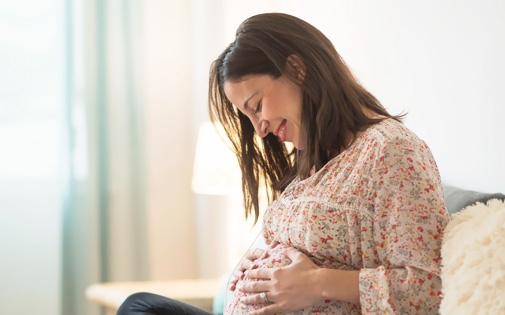How does embryo form?
After the sperm enters into the uterus through the cervical canal, it travels into the fallopian tube.If the timing is correct, and ovulation has occured, there will be an oocyte in the fallopian tube which can be fertilised by the sperm.
First there is a single cell which divides into multiple cells during the next few days.It starts to travel from the fallopain tube into the uterus.If it can implant into the uterine lining called endometrium, the embryo will start to grow.After 9 weeks the embryo is called a fetüs.
How is gestational age calculated?
Pregnancy normally lasts 40 weeks from the first day of the last menstruation (LMP). Pregnancy starts 2 weeks after the first day of the LMP in women who ovulate regularly.It is a routine to calculate gestational age from the LMP for standardisation,although there is no pregnancy during the first 2 weeks.
Gestational age is named as weeks plus days, for example 32 weeks 3 days, this shows the time that has passed from the LMP
The 40 weeks of pregnancy is divided into three trimesters.
Each trimester lasts about 12–13 weeks (or about 3 months):
What is the estimated due date (EDD)?
The day the baby is due is called the estimated due date (EDD). Only 5 percent of pregnant patients deliver on the calculated due date which is the completion of 40 weeks from the LMP.
How is EDD estimated?
EDD is calculated from the first day of LMP. When the patient is not certain about the LMP, an ultrasound exam done during the first trimester can be used to estimate the due date. For patients who had an IVF, the EDD is estimated by the age of the embryo and the date that the embryo is transferred to the uterus.
What happens during weeks 1–4 of pregnancy?
- The dividing fertilized egg moves down the fallopian tube toward the uterus.
- At about 5 days after fertilization, the cluster of dividing cells enters the uterus.
- At about 8–9 days after fertilization, the cluster of cells (now called a blastocyst) attaches to the lining of the uterus.
What happens during weeks 5–8 of pregnancy?
- The placenta begins to form.
- The brain and spinal cord begin to form.
- The tissues that will form the heart begin to beat. The heartbeat can be detected during an ultrasound exam at about 6 weeks of pregnancy.
- Buds for limbs appear with paddle-like hands and feet.
- The eyes, ears, and nose begin to develop. Eyelids form, but remain closed.
- The genitals begin to develop.
- By the end of the eighth week, all major organs and body systems have begun to develop.
What happens during weeks 9–12 of pregnancy?
- Buds for future teeth appear.
- Fingers and toes start to form. Soft nails begin to form.
- Bones and muscles begin to grow.
- The intestines begin to form.
- The backbone is soft and can flex.
- The skin is thin and transparent.
- The hands are more developed than the feet.
- The arms are longer than the legs.
What happens during weeks 13–16 of pregnancy?
- Eyebrows, eyelashes, and fingernails form.
- Arms and legs can flex.
- External sex organs are formed.
- The placenta is fully formed.
- The outer ear begins to develop.
- The fetus can swallow and hear.
- The neck is formed.
- Kidneys are functioning and begin to produce urine.
- In male fetuses, the testicles begin to descend from the abdomen.
- Genitals become either male or female at week 14
What happens during weeks 17–20 of pregnancy?
- The sucking reflex develops. If the hand floats to the mouth, the fetus may suck his or her thumb.
- The skin is wrinkled, and the body is covered with a waxy coating (vernix) and fine hair (lanugo).
- The fetus is more active. You may be able to feel him or her move.
- The fetus sleeps and wakes regularly.
- Nails grow to the tips of the fingers.
- The gallbladder begins producing bile, which is needed to digest nutrients.
- In female fetuses, the eggs have formed in the ovaries.
- It may be possible to tell the sex of the baby on an ultrasound exam.
What happens during weeks 21–24 of pregnancy?
- Real hair begins to grow.
- The brain is rapidly developing.
- The eyes begin to open.
- Finger and toe prints can be seen.
- The lungs are fully formed but not yet functioning.
What happens during weeks 25–28 of pregnancy?
- The eyes can open and close and sense changes in light.
- Lanugo begins to disappear.
- The fetus kicks and stretches.
- The fetus can make grasping motions and responds to sound.
- Lung cells begin to make surfactant.
What happens during weeks 29–32 of pregnancy?
- With its major development finished, the fetus gains weight very quickly.
- Bones harden, but the skull remains soft and flexible for delivery.
- The different regions of the brain are forming.
- Taste buds develop, and the fetus can taste sweet and sour.
- The fetus may now hiccup.
What happens during weeks 33–36 of pregnancy?
- The fetus usually stays in a head-down position in preparation for birth.
- The brain continues to develop.
- The skin is less wrinkled.
- The lungs are maturing and getting ready to function outside the uterus.
- Sleeping patterns develop.
What happens during weeks 37–40 of pregnancy?
- The fetus drops lower into the pelvis.
- More fat accumulates, especially around the elbows, knees, and shoulders.
- The fetus gains about 1/2 pound per week during this last month of pregnancy.
 Obstetrician, Gynecologist, Genital Esthetic Surgeon in Turkey
Obstetrician, Gynecologist, Genital Esthetic Surgeon in Turkey Obstetrician, Gynecologist, Genital Esthetic Surgeon in Turkey
Obstetrician, Gynecologist, Genital Esthetic Surgeon in Turkey